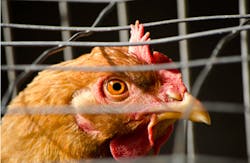Concerns have been raised over the safety of poultry meat being produced in China, following the announcement made on China Central Television (CCTV), the country's national television station, that farmers in Shandong Province, in the eastern part of the country, have been using alarmingly high doses of illegal growth hormones to speed up the growth of their chickens, which are then supplied to fast-food chains.
According to People's Daily Online this is just the latest scandal related to the Chinese food industry, following a number of other disturbing discoveries like tainted milk being sold, cooking oil being illegally recycled and reused and watermelons being treated with toxic chemicals that caused them to explode. Exposing the way farmers treated their chickens has only added to consumers' growing distrust for Chinese farmers.
The national TV station revealed that many farmers have been feeding hormones and antibiotic cocktails to poultry in a bid to reduce the death rate, fueled by the unsanitary conditions in which the chickens live, and accelerate their growth. One of the farmers featured in the report was found to have been giving his chickens at least 18 different types of antibiotic, which resulted in his birds surpassing the three-kilogram mark in body weight in just 40 days. The situation was further aggravated by the fact that some of the drugs that had been used were banned by China's State Food and Drug Administration (SFDA).
RELATED: JBS SA to acquire poultry processor for $63 million
Another serious violation of Chinese laws was also exposed. In some instances, chickens were treated with antibiotics just two days before being slaughtered, whereas the country's poultry-raising regulations state that no drugs should be given to chickens at least one week before they are killed.
CCTV said that two of those farms, located in Gaomi and Pingdu in Shandong Province, supplied their chickens to a slaughterhouse in Pingdu which is owned by a company that is known to supply chicken to the China division of Yum Brands of Shanghai — the owner of KFC fast-food restaurants. According to the report, Liuhe Group, which owns the slaughterhouse, was found to have issued quarantine qualifications without having carried out any tests.
Following the report, the SFDA conducted a food safety inspection at a number of KFC outlets and found that one of the 32 samples it took was suspected of being contaminated with amantadine, an anti-viral drug whose use in food products is banned. As a result, KFC restaurants had to recall related products and the Shanghai food and drug authority started a large-scale inspection of all KFC outlets in the city.
Shortly after, McDonald's also admitted that the Liuhe Group was its second-tier supplier but claimed to have stopped using chicken provided by the company following the report. Another fast-food chain, Japanese Yoshinoya, was also involved in the scandal when the Beijing Animal Inspection authority revealed that chickens supplied by the Liuhe Group had been used in some of its outlets.
Bi Meijia, spokesman for the Ministry of Agriculture, said that poultry raisers and processors involved in the scandal have been shut down and are currently under investigation, People's Daily Online reported.


